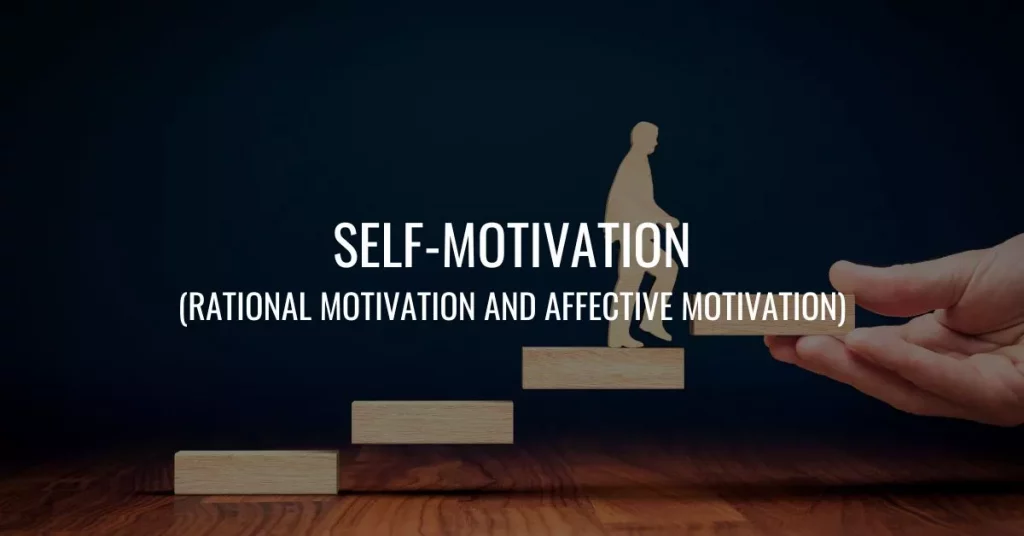Self-motivation (Rational Motivation And Affective Motivation)
Motivations are the drives that an individual has to perform an action; those motivations may lead you to do the right action, and sometimes lead you to do the wrong action; in this article, we will teach you how to control your motivation to do the right action, and how to motivate yourself by self-motivation to develop any competence.
Self-motivation types (rational motivation and Affective motivation):
There are two types of self-motivation (rational motivation, and Affective motivation); to know the difference between them, you should know first the difference between abstract knowledge and experiential knowledge.

The decision process that leads to action starts with two types of knowledge: abstract and experiential.
- Abstract knowledge includes the pure theoretical data and information we refer to as knowledge. The people get the abstract knowledge may be by courses, presentations, written books……etc.
- Experiential knowledge is provided by experienced and gained by perception; experiential knowledge is related to habits and life experiences. People get experiential knowledge through habits or situations.
Rational motivation:
Rational motivation is the result of abstract knowledge; rational motivation appears when the individual uses his knowledge and personal values to foresee the possible consequences of the action.
Rational motivation leads us to act depending on the action’s desirability, that is, depending on what I believe I should do.
Rational motivation example:
- Assume that you attended a course about “teamwork”: in the course, you learned how teamwork improves the organization and enables the employees to achieve the organization’s goals in easy and fast ways; also you learned how to enable teamwork in your organization and you knew the teamwork’s benefits and knew the individual work’s disadvantages.
Till now you haven’t applied your knowledge about teamwork yet; it’s just theoretical knowledge, and all this knowledge is called abstract knowledge, and after attending the course now you are motivated to apply this knowledge in your work; this is called rational motivation.
Affective motivation:
Effective motivation is the result of experiential knowledge; Experiential knowledge gives rise to feelings and emotions that are positive (security, happiness, peace) or negative (fear, sadness, stress). These generate, in turn, an affective motivation (attraction or repulsion) towards the action that is independent of rational motivation.
Affective motivation example:
- Assume that a lot of problems are happened in your life because of some people, so you decided to avoid all people and be alone, and in this way, you become a secluded or lonely person.
In this example, you have knowledge about people regardless this knowledge is right or not, and this knowledge is the result of your experience with some people; this knowledge is called experiential knowledge; this knowledge leads you or motivates you to be far from people in your life and in your work; this motivation is called effective motivation
Affective motivation leads us to act in accordance with the action’s appeal, that is, depending on what I like doing or what seems most attractive to me. When rational motivation (reason) and affective motivation (the heart) move in the same direction, we can say that a habit exists: the individual willingly decides to follow that direction, almost without thinking about it.
Self-motivation Challenges:
The problem arises when the two motivations are not aligned. This gives rise to a motivational conflict that requires the use of will.
- Ex: Assume that you attended a course about teamwork (so you have rational motivation for teamwork), and at the same time you’re a secluded or lonely person because of problems with some people (so you have effective motivation against teamwork); in this case, the two types of self-motivations aren’t aligned, so you should use your will to apply your abstract knowledge about teamwork and use your rational motivation.
- Will is the individual’s innermost core, the abode of his attitude and, in essence, his freedom. To acquire a new habit, the individual must make a decision moved by rational motivation, even when this is against his effective motivation.
- You should have good rational knowledge by studying well why applying that abstract knowledge is important for the individual and for the organization; this good knowledge helps you to have a will.
- When the individual performs actions moved by this rational motivation, he learns experientially the advantages of the new behavior, until a time comes when affective motivation becomes aligned with rational motivation. When this happens, we can say that a new habit has been acquired.
Application of the Model in Practice
We can apply this process to the development of any competence. For our example, we will use the case of delegation. A manager who does not have this competence could start to develop it by attending a course or by reading a book about delegation in which he will be told what delegation consists of and how he can make a delegation to the right person and by the right way. By this means, the manager receives information on the subject and broadens his stock of abstract knowledge.
However, since he has not yet delegated, his experience inclines him towards not using delegation and, therefore, his affective motivation towards it will no doubt include a certain degree of repulsion. Consequently, it is very likely that the course he has attended will be insufficient to change his habits in this competence.
The next step in the process of developing any competence is adequate education, that is, the education that helps the individual think about the consequences of his actions and omissions. This education can be given in interactive courses that use the case method, or on the job through the example of his hierarchical superior or other people.
Thus, his boss could start by giving an example of this competence to the manager who does not know how to delegate by delegating specific tasks to him. This should help him think about the advantages that this way of doing things could have for him and for his subordinates.
By this means, the manager will be able to broaden his vision of reality and strengthen his rational motivation on the desirability of delegation.

Patrick is a lifelong learner and personal development blogger whose work focuses on mindset shifts, emotional growth, and the hard-won lessons from real-life challenges.
Qualities: Relatable, honest, introspective, growth-oriented.
